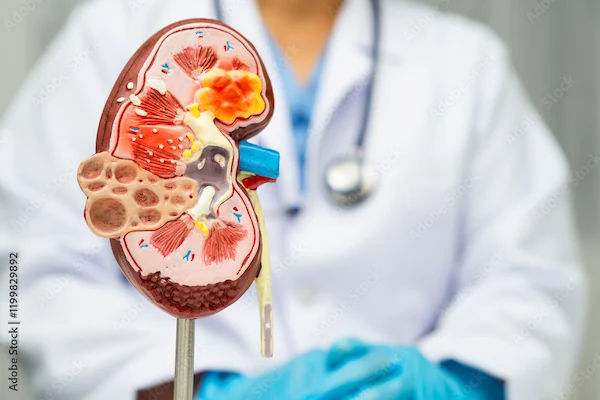Autoimmune Nephropathies and Diagnostic Tests
Learn about autoimmune nephropathies, their causes, symptoms, and the diagnostic tests used to detect kidney-related autoimmune disorders for early and effective treatment.

Written by Dr. Siri Nallapu
Reviewed by Dr. Shaik Abdul Kalam MD (Physician)
Last updated on 26th Aug, 2025

Autoimmune nephropathies are a group of kidney diseases caused by an overactive immune system mistakenly attacking healthy kidney tissues. These conditions can lead to inflammation, scarring, and impaired kidney function over time. If left untreated, they may progress to chronic kidney disease (CKD) or even kidney failure.
This article will help you understand autoimmune nephropathies, their symptoms, causes, and the diagnostic tests used to detect them. We’ll also discuss ways to manage the condition and when to seek medical help.
What Are Autoimmune Nephropathies?
Autoimmune nephropathies occur when the body’s immune system, which normally fights infections, starts attacking the kidneys. Some common autoimmune kidney diseases include:
Lupus Nephritis (caused by systemic lupus erythematosus)
IgA Nephropathy (Berger’s disease)
ANCA-associated Vasculitis (affects small blood vessels in the kidneys)
Membranous Nephropathy (thickening of kidney filters)
These conditions damage the kidneys' filtering units (glomeruli), leading to protein leakage, blood in urine, and reduced kidney function.
Common Symptoms to Watch For
Early detection is crucial to prevent severe kidney damage. Look out for these signs:
Swelling (Edema) – Especially in the legs, ankles, or around the eyes due to fluid retention.
Foamy or Bloody Urine – Caused by protein or blood leakage.
High Blood Pressure – Kidney disease can raise blood pressure.
Fatigue & Weakness – Due to anemia or toxin buildup.
Frequent Urination or Reduced Output – Changes in urine patterns.
If you notice these symptoms, consult a doctor for further evaluation.
What Causes Autoimmune Nephropathies?
The exact cause is unknown, but several factors may contribute:
Genetic Predisposition – Family history increases risk.
Environmental Triggers – Infections, toxins, or certain medications.
Other Autoimmune Diseases – Lupus, rheumatoid arthritis, or vasculitis.
Diagnostic Tests for Autoimmune Nephropathies
Early diagnosis helps in managing the disease effectively. Doctors may recommend:
1. Blood Tests
Serum Creatinine & eGFR – Measures kidney function.
ANA (Antinuclear Antibody Test) – Detects autoimmune activity (e.g., lupus).
ANCA Test – Checks for vasculitis-related antibodies.
2. Urine Tests
Urinalysis – Detects protein, blood, or abnormal cells.
24-Hour Urine Protein Test – Measures protein leakage.
3. Imaging Tests
Ultrasound or CT Scan – Checks kidney size and structure.
4. Kidney Biopsy
A small kidney tissue sample is examined under a microscope to confirm the diagnosis and assess damage severity.
Get Your Health Assessed
How to Manage Autoimmune Nephropathies?
While there’s no cure, proper treatment can slow disease progression. Management includes:
1. Medications
Immunosuppressants (e.g., steroids, cyclophosphamide) to reduce immune attacks.
Blood Pressure Control (ACE inhibitors or ARBs) to protect kidneys.
2. Lifestyle Changes
Low-Sodium Diet – Reduces swelling and blood pressure.
Protein Moderation – Eases kidney workload.
Stay Hydrated – Helps flush toxins.
Avoid NSAIDs (like ibuprofen) – They can harm kidneys.
3. Regular Monitoring
Routine blood and urine tests to track kidney function.
When to See a Doctor?
If you experience persistent swelling, blood in urine, or unexplained fatigue, consult a nephrologist (kidney specialist). Early intervention can prevent complications.
Need Help? Book a Consultation Today!
If you suspect kidney issues, Apollo 24|7 offers expert nephrology consultations and diagnostic tests. Early detection can make a big difference in managing autoimmune nephropathies effectively.
Final Thoughts
Autoimmune nephropathies are serious but manageable with timely diagnosis and treatment. Pay attention to symptoms, follow medical advice, and adopt kidney-friendly habits to protect your health.
Consult a Top Nephrologist
Consult a Top Nephrologist
Dr Ch Sashidhar
Nephrologist
20 Years • MBBS, MD General Medicine, DNB, Nephrology
Secunderabad
Apollo Hospitals Secunderabad, Secunderabad

Dr. Pardha Saradhi
Nephrologist
9 Years • MBBS, MD-DNB (Gen. Med.), DNB (Nephro)
Hyderabad
Apollo Hospitals D R D O kanchanbagh, Hyderabad
(75+ Patients)

Dr. Manju Kamal
Nephrologist
12 Years • MBBS,MD(General Medicine), DNB,DM(Nephrology)
Angamaly
Apollo Hospitals Karukutty, Angamaly

Dr. Kity Sarkar
Nephrologist
15 Years • MBBS,MD(Genl. Med.), DrNB(NEPHROLOGY)
Kolkata
Dr. Kity Sarkar's Clinic, Kolkata

D. Akshay Zalavadiya
Nephrologist
3 Years • MBBS, MD, DM Nephrology
Ahmedabad
Beacon kidney consult, Ahmedabad

.jpg)



